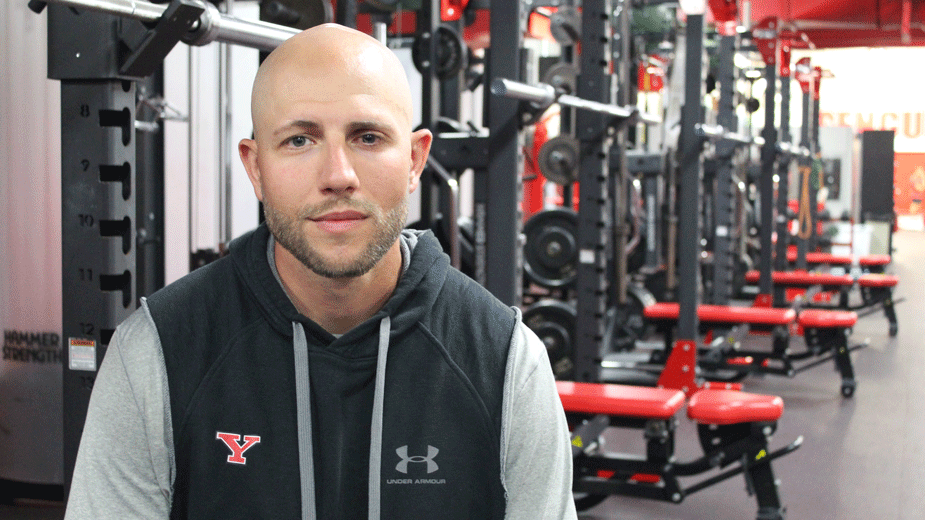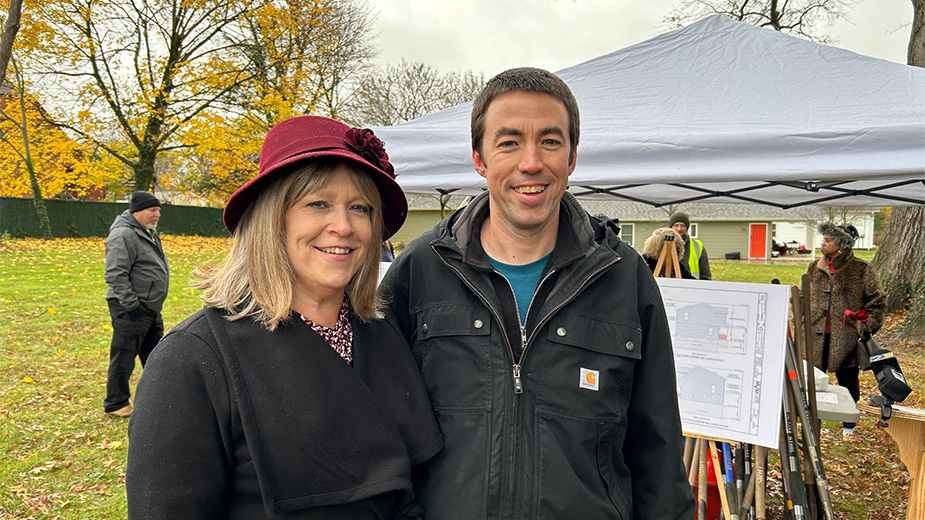Penguins’ ‘Foundation’ Builds in Weight Room
YOUNGSTOWN, Ohio – As he leads the team in stretching out after a morning practice, the new strength and conditioning coach for the Youngstown State Penguins football team has an announcement: “If you had a note in your locker this morning, you’re with me. You know who you are.”
Players trade looks and, when they’re finished stretching, those who got notes head to Stambaugh Stadium’s north endzone. There, Terry Grossetti leads them through exercises.
Already that day, they worked out in the weight room – 7:30 to 9:45 a.m. – and on the field in the early August heat, until noon. And then, Grossetti gave them more to do. All of it, he says, is to make this team the best it can be.
“The foundation of our football program is in the weight room. It’s where we establish rules, standards, culture. All that stuff is what I work with players on through the offseason so that when we come to camp, they’re ready to go for Coach Bo and the staff,” he says. “The foundation of strength training is to make athletes faster and more explosive. Everything we do is geared toward explosive, fast, powerful athletes.”
Last year, players say, much of the strength training they went through was focused on bulking up and putting up big numbers in the weight room. But under Grossetti, the focus has been on-the-field movement
“We’re on the field a lot more and even when we’re lifting, they’re football-specific. It’s really been night and day,” says running back Joe Alessi, who injured his shoulder last year and required surgery in the offseason. “The entire program, since he got here, has changed. He knows what he’s doing and he’s extremely motivational. Everybody wants to work with him and improve their body.”
To help his shoulder heal, Alessi – one of the stable of running backs who will share carries this season – was barred from contact drills in training camp and worked with Grossetti through elastic-band exercises to improve his strength.
That sort of work, adds tight end Miles Joiner, should set the Penguins up to stay healthier longer through the season.
“Coach Grossetti is really big on injury prevention. You can’t prevent them, but we’re doing a lot of things in the weight room that lowers the risk of getting hurt,” he says.
Head Coach Bo Pelini notes that it’s Grossetti’s work outside of the weight room that made him a good fit on the coaching staff.
“Everyone thinks it’s about building up strength. Yeah, that’s part of it. But it’s developing athleticism, flexibility, all the things that equate to being a good football player,” Pelini says. “He’s worked hard at it and the players have responded well to him. For that, we’re happy to have him.”
In his own words, Grossetti’s philosophy is all about explosiveness, not necessarily just speed. Running fast in a straight line is good and can be useful, but it’s not how football is played.
“We have to challenge them to move in these different planes and get them moving in ways that mimic the ways a football player plays,” he says. “Plays might be 10 seconds long, so our players have to maximize what they can do in that time period.”
As a player, that served Grossetti well. The New Castle, Pa., native played three years at wide receiver for Slippery Rock University – he currently ranks No. 8 in all-time touchdown receptions and 17th in receiving yards – before playing for two seasons with the Pittsburgh Power of the Arena Football League. After that, he launched his own gym, Grossetti Performance in New Castle, where some of the YSU players worked out, including NFL Draft selections Derek Rivers and Avery Moss.
While he never personally worked with Grossetti, Joiner says a lot of guys in his position group had, giving him reason to be excited when Grossetti’s hiring was announced in late April.
“We’re learning to be uncomfortable. Last year, we had a good strength program but we were conditioned and didn’t know how to be uncomfortable,” Joiner says. “Everybody’s straining and putting in effort. We’re doing things we’ve never done before. It’s all things we’ve never done before. That’s the thing that makes us a better team off the field.”
During the offseason, the NCAA limits how much coaches can interact with their team. No contact is allowed between spring camp – earlier this year, YSU’s camp ran March 23 to April 16 – and summer training that usually starts Aug. 1. In those windows, the strength and conditioning coach is among the only members of the coaching staff allowed to interact with players.
“They have more access on a consistent basis, with the way the rules are, than any other coach in the program. They’re big for the culture of a program and the discipline and all the things that are necessary to build a football team,” Pelini says.
Across college football, strength and conditioning coaches are increasingly becoming right-hand men to head coaches. Year-round contact means they serve as bridges between player and coach. Daily workouts for the Penguins begin at 7:30 a.m. during training camp, meaning Grossetti is among the first staff to meet with players.
And across the NCAA, conditioning coaches are well-trained professionals. In 2015, the governing institution of college athletics required that full-time strength coaches have at least one industry certification. Grossetti holds certification from the International Sports Science Association.
“There are a lot of programs out there in physiology and exercise science. Those are important but one of the best things you can get is experience. I’m fortunate that I’ve shadowed and worked with a lot of really good strength coaches in my life,” he says.
On that list are the head strength and conditioning coaches for the Baltimore Ravens and Tampa Bay Buccaneers, Steve Saunders and Anthony Piroli, respectively.
Last season didn’t pan out the way many around the program expected. A season-opening loss to Butler University was followed with a handling by a much larger West Virginia University. Over the course of the season, the team never quite found its footing and injuries piled up.
With Grossetti joining YSU in late April, after spring camp had wrapped up, he almost immediately turned his attention to building the culture Pelini wanted and started developing workouts to help players avoid injury.
“When I came in, it was a lot of work getting to know them and getting them to believe in it. If a kid can’t trust you, he’s not going to want to train with you and believe in your philosophy,” he says. “I want to get our guys as healthy as possible and train them as hard as possible while keeping them healthy. We’re doing really in-depth speed work with our players. It’s not just aimless conditioning. This is stuff that’s going to help them run more efficiently and move better.”
Ahead of Youngstown State’s season opener Aug. 24 in Montgomery, Ala., against Samford University, Grossetti and the training staff were thinking of ways to acclimate the team to the humid Southern summers. One idea that was considered: shut the team in the Watson and Tressel Training Site for a practice.
“Youngstown gets hot and humid too; we’ve been doing a good job of getting them hydrated. But it’s definitely something in the back of our minds that we’re looking to implement,” he says.
The necessity of a good strength and conditioning coach isn’t lost on Grossetti or the rest of the Penguins staff. The work done on and off the field, whether in the weight room or on the turf at Stambaugh Stadium, during the offseason is what can set this year’s team apart.
“It determines what we can be as a team. Teams may have great physical players, but if they’re not in shape, they limit how good they can be,” Grossetti says. “That’s what I’m here to do. I won’t let our conditioning levels be our limiting factor between winning a championship and not.”
Pictured: Terry Grossetti has worked with the Baltimore Ravens’ and Tampa Bay Buccaneers’ strength coaches.
Copyright 2024 The Business Journal, Youngstown, Ohio.



